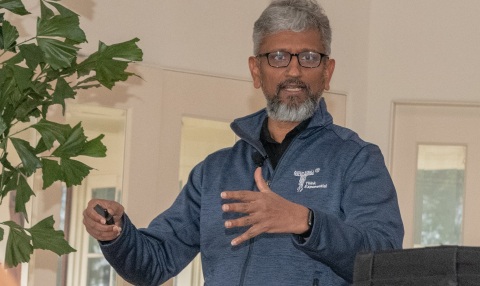Intel Demonstrates 10nm-based PCs, Data Center and Networking Systems, Next-Gen ‘Sunny Cove’ Architecture with AI and Crypto Acceleration, and Industry’s First 3D Logic Chip Packaging Technology
SANTA CLARA, Calif. — (BUSINESS WIRE) — December 12, 2018 — At Intel “Architecture Day,” top executives, architects and fellows revealed next-generation technologies and discussed progress on a strategy to power an expanding universe of data-intensive workloads for PCs and other smart consumer devices, high-speed networks, ubiquitous artificial intelligence (AI), specialized cloud data centers and autonomous vehicles.
This press release features multimedia. View the full release here: https://www.businesswire.com/news/home/20181212005197/en/

At Intel Architecture Day on Tuesday, Dec. 11, 2018, Raja Koduri, Intel chief architect, senior vice president of Core and Visual Computing Group and general manager of Edge Computing Solutions, explains how the company is positioned to deliver leadership products across architectures and workloads for an expanding data-centric market. (Credit: Intel Corporation)
Intel demonstrated a range of 10nm-based systems in development for PCs, data centers and networking, and previewed other technologies targeted at an expanded range of workloads.
More: New Intel Architectures and Technologies Target Expanded Market Opportunities (Q&A with Intel’s Raja Koduri)
The company also shared its technical strategy focused on six engineering segments where significant investments and innovation are being pursued to drive leaps forward in technology and user experience. They include: advanced manufacturing processes and packaging; new architectures to speed-up specialized tasks like AI and graphics; super-fast memory; interconnects; embedded security features; and common software to unify and simplify programming for developers across Intel’s compute roadmap.
Together these technologies lay the foundation for a more diverse era of computing in an expanded addressable market opportunity of more than $300 billion by 2022.1
Intel Architecture Day Highlights:
Industry-First 3D Stacking of Logic Chips: Intel demonstrated a new 3D packaging technology, called “Foveros,” which for the first time brings the benefits of 3D stacking to enable logic-on-logic integration.
Foveros paves the way for devices and systems combining high-performance, high-density and low-power silicon process technologies. Foveros is expected to extend die stacking beyond traditional passive interposers and stacked memory to high-performance logic, such as CPU, graphics and AI processors for the first time.
The technology provides tremendous flexibility as designers seek to “mix and match” technology IP blocks with various memory and I/O elements in new device form factors. It will allow products to be broken up into smaller “chiplets,” where I/O, SRAM and power delivery circuits can be fabricated in a base die and high-performance logic chiplets are stacked on top.
Intel expects to launch a range of products using Foveros beginning in the second half of 2019. The first Foveros product will combine a high-performance 10nm compute-stacked chiplet with a low-power 22FFL base die. It will enable the combination of world-class performance and power efficiency in a small form factor.
Foveros is the next leap forward following Intel’s breakthrough Embedded Multi-die Interconnect Bridge (EMIB) 2D packaging technology, introduced in 2018.
New Sunny Cove CPU Architecture: Intel introduced Sunny Cove, Intel’s next-generation CPU microarchitecture designed to increase performance per clock and power efficiency for general purpose computing tasks, and includes new features to accelerate special purpose computing tasks like AI and cryptography. Sunny Cove will be the basis for Intel’s next-generation server (Intel® Xeon®) and client (Intel® Core™) processors later next year. Sunny Cove features include:
- Enhanced microarchitecture to execute more operations in parallel.
- New algorithms to reduce latency.
- Increased size of key buffers and caches to optimize data-centric workloads.
- Architectural extensions for specific use cases and algorithms. For example, new performance-boosting instructions for cryptography, such as vector AES and SHA-NI, and other critical use cases like compression and decompression.
Sunny Cove enables reduced latency and high throughput, as well as offers much greater parallelism that is expected to improve experiences from gaming to media to data-centric applications.
Next-Generation Graphics: Intel unveiled new Gen11 integrated graphics with 64 enhanced execution units, more than double previous Intel Gen9 graphics (24 EUs), designed to break the 1 TFLOPS barrier. The new integrated graphics will be delivered in 10nm-based processors beginning in 2019.
The new integrated graphics architecture is expected to double the
computing performance-per-clock compared to Intel Gen9 graphics. With >1
TFLOPS performance capability, this architecture is designed to increase
game playability. At the event, Intel showed Gen11 graphics nearly
doubling the performance of a popular photo recognition application when
compared to Intel’s Gen9 graphics. Gen11 graphics is expected to also
feature an advanced media encoder and decoder, supporting 4K video
streams and 8K content creation in constrained power envelopes. Gen11
will also feature Intel® Adaptive Sync technology enabling smooth frame
rates for gaming.

